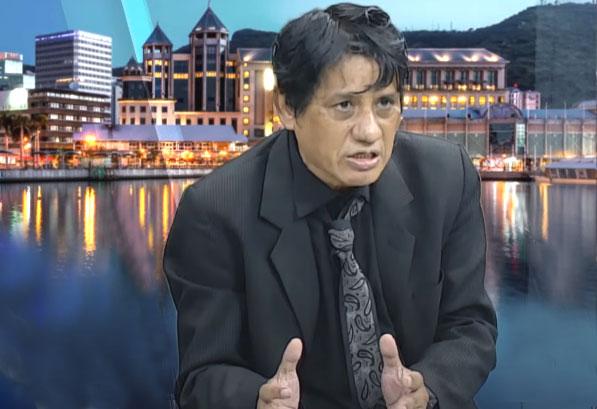Africa-Press – Mauritius. This week, the resignation of several members of the MMM regional committee is gaining public attention. Yet this kind of behavior by members of the political class no longer surprises anyone.
On the contrary, the younger generation expects an increased development of integrity and dignity on the part of men and women in politics. Also, we invite you to know the reactions of Jocelyn Chan Low, Mauritian historian and political observer.
Mauritius Times: After the resignation of more than 25 members of the regional committee of the MMM of constituency No 6 (Grand-Baie / Poudre-d’Or), as well as that of the former village president and member of the central committee of the MMM , Vinay Sobrun, another departure to report this week: Madun Dulloo, a potential prime minister, but whose resignation does not seem to be of great concern to the party.
Is this normal? Jocelyn Chan Low: There is nothing new about this. In fact, some of the resigners had already resigned and campaigned against the MMM before returning to the fold.
Then the change of political allegiance became commonplace in political life in Mauritius. Often, it is the result of negotiations with the regime in place which finds its interest in weakening the opposition through the poaching of its cadres and activists.
We know the scenario: a group of dissidents from an opposition party holds a press conference to criticize their former party and praise the government.
And everything is relayed at length by the national television station on the television news. This is all déjà vu and no one is fooled. It should be noted that this practice dates back to well before the general election of 2014.
* The resigners of Grand-Baie / Poudred’Or evoked the same reasons as many others before them to justify their departure from the MMM: “differences of opinion, inaction within the party, an unhealthy situation, ‘business as usual ‘, zig-zags… ”, which would not allow the party to go up the slope.
Do you think that is also the basic feeling? These ‘faults’ they say they deplore within the MMM have been the subject of criticism from others who have resigned in the past.
But the current resigners suddenly find out about them today. Having said that, if one takes a broader perspective, it is evident that MMM has been going through a difficult phase in its history for some time.
Over the years, there has been a growing dissociation between the MMM and the bulk of its electorate and, subsequently, with some of its ‘militant coaltar’.
This is due to several reasons, including the abandonment of the class struggle and any anchoring at the trade union level, and its transformation into a strictly traditional parliamentary party, playing the game of ‘ethnic politics’ as required by the system.
.
The result is that the early activism that had greatly contributed to its rise is no longer there, a large number of party cadres have moved elsewhere and the next generation is relatively shy.
The only initiatives taken by the leadership remain at the level of alliances and at the level of parliament. While the streets rumble and the protest escalates on social media, the party remains relatively withdrawn.
And the base of MMM has shrunk a lot over the years. We know the difficulties the party experienced in mobilizing its activists in the context of the 2019 general elections.
In fact, we are very far from the machinery of the MMM that I knew from the inside in the 70s and 80s. Likewise, the MMM relies heavily on its glorious past, heroic years of embers.
But from 1970 to 2021, it’s been over 50 years. And today’s generation lives in the immediacy. What does the party have to offer him? Revisiting its political offer for the 21st century is a quasi-existential question for the MMM if it does not want to find itself in the category of ‘has been’.
* How do the grassroots feel towards the Entente de l’Espoir, an alliance between the Bodha, Bhadain and Duval, in your opinion?
The activist base was not consulted about this Entente because the regrouping does not constitute an alliance. There was no assembly of delegates to decide the issue.
But I doubt the activists are against it – the MMM having worked with Maurice Allet’s PMSD for years while Roshi Bhadain is a sure bet in the opposition. As for Nando Bodha, as far as I know, he was not approached as a leader of any alliance . . .
* We remember that almost three weeks ago, Madun Dulloo criticized Nando Bodha and Roshi Bhadain, the very people who spent most of their political careers trying to demolish both the PTr and the MMM or even the PMSD, and which suddenly discovered affinities with these same parties.
If you were told that this “agreement of hope” contains within itself the seeds of its own destruction, what would you say to that? I do not believe that it is a question here of affinities but rather of political strategy vis-à-vis the regime in place because any fragmentation of the opposition can only benefit Pravind Jugnauth, the system of ‘First Past The Post ‘ helping.
The last general election demonstrated this in a vivid way. Any agreement or alliance between political parties automatically leads to frustration and disappointment.
In Mauritius, the “front bench” of a party or an alliance is determined by the concern for ethnic, even sub-ethnic representation – symbolic of a given personality.
Obviously, the arrival for example of Nando Bodha can only harm Madun Dulloo’s legitimate ambitions. This fact has been the source of many crises and dissent within the MMM in the past.
* One observation, however, is that the opposition has so far failed to present itself as a credible alternative to the ruling alliance.
The leaders of the two main opposition parties suffer from serious handicaps – that of the PTr because of the ‘character assassination’ campaign waged against him by the MSM since 2015, and the other with the electorate itself.
because of its “unnatural” alliances, from which a good part of its electorate has gradually distanced itself. But it’s still hard to believe that PTr and MMM are “spent forces” today, right?
I don’t think it can be said that the PTr or even the MMM have become ‘spent forces’. It should not be forgotten that these two parties, along with the PMSD, collected more than 50% of the votes in the last general elections.
However, the Ptr faces a major problem resulting from the “character assassination” campaign against Navin Ramgoolam. This campaign greatly tarnished his reputation despite the fact that he was cleared of most of the charges by the judiciary.
Navin Ramgoolam’s decision, however, cannot be predicted with respect to either his political career or his succession after returning from India where he is currently undergoing treatment.
As for the MMM, it finds itself confronted with the disillusionment of a section of the electorate towards the traditional parties, with the consequence of a proliferation of small parties which risk nibbling in its electorate and prejudicing it in the event of a mixed vote in some.
urban constituencies. To return to the PTr, it seems that the candidate Damry for the succession of Navin Ramgoolam is not unanimous. It could even cause the split of the party, support some members of the PTr in private .
.
. Any succession within a party inevitably causes friction and disappointment. This is where the qualities of any new leader are measured.
It is up to him to ensure that the party does not come out of this bruised exercise. However, PTr has a much more successful ‘crisis management’ history than MMM.
* In view of the balance of power on the political spectrum, do you think that the next municipal elections are a crucial test for the 2024 deadline?
Of course, the municipal elections will be very important in relation to the political development of the country! The Government, although it controls the municipalities, goes in these elections as a challenger, as in the last general elections it was the opposition parties that won a majority of seats in the urban constituencies.
And in addition, we will see if the opposition can present a united front against the regime in place. Likewise, we will know the electoral weight of the new parties.
However, there is one factor that may confuse the issue: the abstention rate. In general, it is around 50%. What about in times of pandemic? We’ll see…
* The PTr distanced itself from the Accord of Hope over the opposition leadership affair, which remains unresolved. Do you see the PTr moving decisively towards the next general election on its own, or has the data changed for some time?
Difficult to say at this stage although some leaders say the party is preparing to face the next election on its own. But it’s unclear at this point whether the Ptr will be led by Navin Ramgoolam or anyone else. If Navin Ramgoolam is not leading the Ptr, anything becomes possible: not just a regrouping of opposition forces but also an alliance with the MSM.
In fact, there have recently been some signals, perhaps deliberately maintained by the MSM, to this effect after the famous photo of Pravind Jugnauth and Navin Ramgoolam conversing at a reception at the Indian Embassy.
Then the PM was still very careful to facilitate the transfer of Navin Ramgoolam to India for his treatment. That said, the weight of foreign influence in political life in Mauritius should not be underestimated. There have been documented examples in the past.
And, today, as a new cold war is looming on our doorstep, and Agaléga is at the heart of a geostrategic device for one of the protagonists, it would hardly be surprising to see foreign influences maneuvering so that ‘a regime which is favorable to him remains in power. This has been seen elsewhere.
* In the meantime, it seems that Pravind Jugnauth still remains the master of the game, with the various political formations newly created by Bruno Laurette and others who do not manage to weigh heavily on the chessboard and the traditional parties are still struggling to find a solution.
true understanding . . . Obviously, Pravind Jugnauth remains the master of the game despite the growing unpopularity of the regime, especially because of the economic and social consequences of Covid-19 and the various “cases”.
But this is largely due not only to the opposition’s inability to unite and present a credible alternative, but also to the fact that the old ones hang on while the younger generation calls for renewal. This renewal is taking place through the emergence of a myriad of small parties which can only add to the confusion on the political spectrum.
* With regard to the Prime Minister’s management of the affairs which have dominated the news since the beginning of his mandate in relation to Soopramanien Kistnen, Yogida Sawmynaden, St Louis Gate, and others, do you see Pravind Jugnauth holding on until? to 2024?
To this day, there is absolutely no reason for the government to collapse. Of course, there are election petitions, but the time for justice is very long.
As for the various cases, investigations are dragging on and it is hard to believe that they will be completed quickly. In addition, the government has a strong parliamentary majority.
There is obviously street opposition. We can refer to the monster demonstrations in Port Louis in August 2020 and February 2021. But, in Mauritius, political life takes place in the shadow of constitutionalism.
The streets will never overthrow an elected government. Everything will be decided at the polls. And, for the moment, with hopelessly divided opposition Jugnauth has all the cards in hand for a reappointment.
Certainly, there are those who will cry Wolf! ’When talking about a coming economic crisis. But in the current geopolitical context, the regime will still be able to borrow .
..







